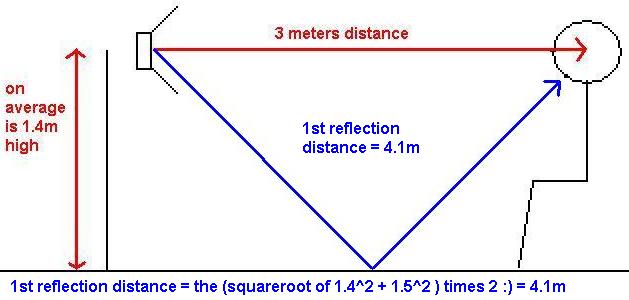 Malaysia
Boleh
Malaysia
Boleh 
How long for sound to reach us?
The answer depends on how
fast do sound travel.
It is 347.3m/s at 27º Celsius at xx% humidity, near sea level.
Heheheh forgot the
humidity levels J
if someone remembers the textbooks value, please let me know J
For sound to travel 1m, it
is 1/347.3 = 0.00287 seconds.
Q = Do sound reflects?
A = YES & NO, depends on what it hits.
Q = How do sound reflects?
Q = How many reflections
are they?
ACOUSTICS SECTION AUDIO SECTION CAR SECTION
HOME - Technical Website for Acoustics, Audio and Car
Say for Home Hi-Fi: -
Listener generally seats 3 meters away from the speakers, therefore: -

So, for the sound to travel 3 m takes 3 / 347.3 = 8.6 ms
For the closest reflection = 1st reflection = 1st interference to original sound source = 4.1 m and it takes 4 / 347.3 = 11.5 ms
This means there is actually only 11.5 - 8.6 = 2.9 ms or PURE, real original sound
and hey, what happen to human's brain processing sound issue?
Human brains adopt around 35 ms of time window before processing it. This means in the 35 ms window, only 2.9 ms is pure, while 32.1 ms has invasion from reflections from all over the place, time and angle.
32.1 / 35 = 91.7 % are invasion by reflections :(
But wait, the music sound is continuous / non stop until it stops playing. Normal songs have an average time of 4 minutes, that's 4 x 60 x 1000 = 240,000 ms.
so, only the 1st 2.9 ms is considered the purest therefore 239,997.1 ms of invaded reflections time :(
so again 239,997.1 / 240,000 = 99.99879166666667% of the time humans are hearing sound in conjunction with reflections. Not pure.
For the case of Car Audio
Assuming right driver listening to right tweeter: -
direct sound path is around 0.5 m, assume reflection from ceiling, which has a traveling path around 0.7 m therefore
performing all the calculations as above..... it is also equivalent that 99.9999% of the time humans are hearing to sounds in conjunction with reflections. Not pure.